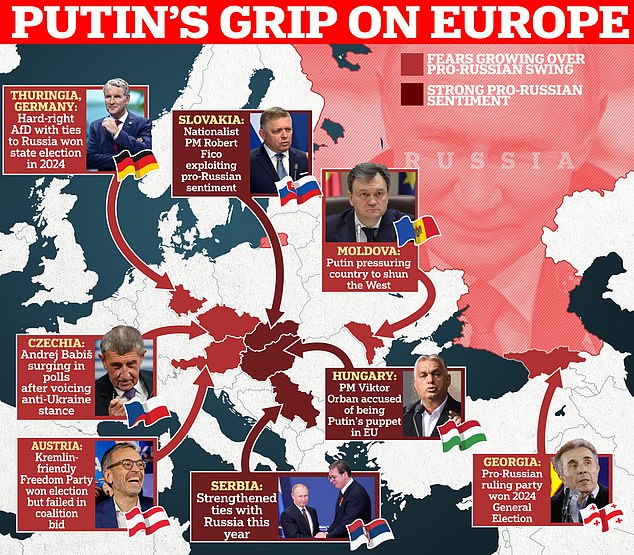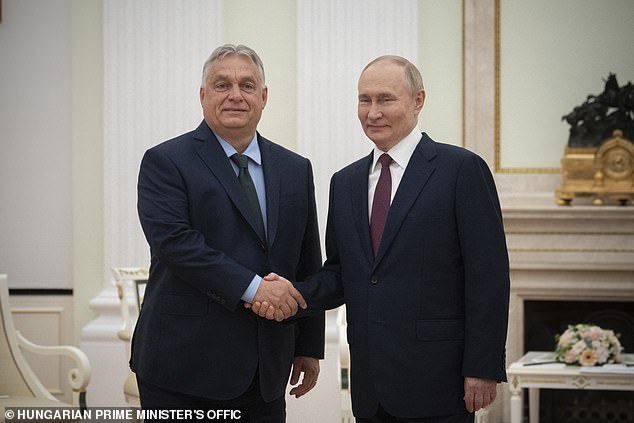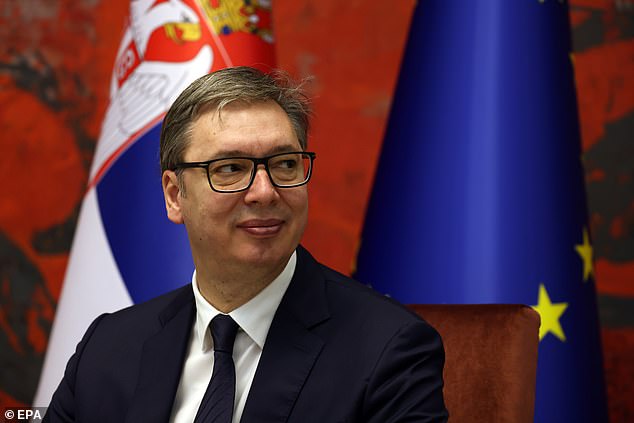- Russia’s war in Ukraine is rumbling steadily toward a third miserable winter
- Amid EU’s support for Kyiv, pro-Russian sentiment is growing on the continent
As Russia’s war in Ukraine rumbles steadily toward a third bitter winter of misery, many of Kyiv‘s European partners are reiterating their unwavering support in the face of Moscow’s aggression.
Prime Minister Keir Starmer declared Britain, France and Germany will back Ukraine for ‘as long as it takes’ after meeting French President Macron and German Chancellor Scholz in Berlin earlier this month.
Volodymyr Zelensky just yesterday said the Nordics were forming a new ‘format of cooperation’ dubbed ‘Ukraine + Northern Europe’ that will see Denmark, Sweden, Norway, Finland and Iceland roll out new support packages alongside ironclad diplomatic backing.
And Poland and the Baltic states of Latvia, Lithuania and Estonia are united in what they see as a serious Russian threat on their borders, ramping up their defence spending and fully sympathetic to the Ukrainian cause.
Yet despite such widespread support, Ukraine’s friends have been powerless to prevent an unsettling wind sweeping in from the East and tilting some European members toward the Kremlin.


Some European nations are already comfortably in the Kremlin’s orbit.
Despite their EU membership, two of Ukraine’s neighbours are led by politicians who have openly railed against Europe’s condemnation of Putin amid the Ukraine war.
Hungary’s Prime Minister Viktor Orban, is perhaps Russia‘s staunchest advocate in Brussels.
He says his good relations with Putin make Hungary the ‘only nation that can speak to everyone’, and paints himself as a well placed intermediary between East and West.
But his conduct has suggested otherwise.
Just one day after Hungary assumed the EU’s rotating presidency in July, Orban declared that Volodymyr Zelensky must order his troops to lay down his weapons and enter immediate negotiations with Moscow.
He has visited the Kremlin on multiple occasions to hold talks with Putin and has routinely blocked, delayed or watered down EU efforts to roll out support packages for Kyiv, prompting EU chief Ursula von der Leyen to order top EU officials to skip a series of meetings in Hungary.
Budapest has also refused to provide any material assistance to Ukraine as its armed forces fight valiantly to hold off the Russian advance.
The EU’s top diplomat, Josep Borrell, has stated Orban ‘does not represent the EU’ when he travels to Russia – and issued the same statement on Monday after the Hungarian President announced he would head to Georgia to congratulate the pro-Russian government on an election win marred by claims of tampering this past weekend.
Alongside Orban stands the President of Slovakia, Robert Fico.
The 60-year-old narrowly escaped death earlier this year after being shot at near-point-blank range by a would-be assassin as he stepped out of a government meeting.
When interrogated by police, the shooter, 71-year-old Juraj Cintula told investigators that he regarded Fico’s government ‘as a Judas toward the European Union’ and said his decision to block aid to Ukraine was the primary motivator of his attack.
Populist Fico has long had a knack for following opinion polls and shaping his policies and campaigns accordingly, analysts say.
He has enjoyed a long and storied political career skilfully weaving between pro-European mainstream and nationalistic anti-Brussels and anti-American stances when it served him to do so.
But he has embraced more extreme positions over the past four years and tilted strongly toward Russia, opposing sanctions and threatening to veto any future NATO membership invite for Ukraine.
And he has expressed admiration for Orban, describing him as ‘one of those European politicians who do not fear to openly defend the interests of Hungary and Hungarian people.’
Putin holds another ally just south of Hungary in President Aleksandar Vucic of Serbia.
While much of Europe dramatically reduced their reliance on Russian gas following the outbreak of war in Ukraine, Serbia was only too happy to keep on guzzling Moscow’s supplies.
Earlier this month, Vucic and Putin enjoyed a lengthy phone call to mark the 80th anniversary of the liberation of Belgrade from fascism amid World War II by Stalin’s Red Army.
‘We have had a long, good, open and meaningful conversation,’ the Serbian president said. ‘We also talked about those who are weak [pro-Western] leaders.’
‘I especially thanked him for helping… to secure sufficient natural gas quantities from Russia to Serbia this winter,’ he said.
Serbia currently holds EU candidate status, but although Vucic aspires to join the likes of Orban and Fico as a member of the bloc, he has routinely declared his opposition to sanctioning Russia and speaks fondly of his relationship with Putin.





This weekend brought another success for the Kremlin in Europe as Georgia’s pro-Russian ‘Georgia Dream’ party narrowly emerged victorious from a hotly disputed election on Saturday.
Orban decided to visit Tbilisi to congratulate Georgia Dream despite widespread claims of election rigging via ballot stuffing, voter intimidation and vote buying.
The US and EU have both urged a full investigation into reports of violations in the voting, though it has not alleged the election was rigged.
But Georgian President Salome Zourabichvili refused to acknowledge the election results, claiming her nation had fallen victim to a ‘Russian special operation’.
She also called on citizens to take to the streets to protest what she called a ‘total falsification’ aimed at pulling Georgia back into Moscow‘s orbit.
The Georgian Dream party was established by Bidzina Ivanishvili, a former Prime Minister and billionaire who like many oligarchs amassed a fortune in Russia during the 1990s following the breakup of the Soviet Union.
It claims it wants to forge ahead with EU membership in spite of efforts to build strong ties with Russia.
But Ivanishvili’s party has become increasingly authoritarian over the past year.
It passed several pieces of legislation adopting similar tactics to those used by the Kremlin to crack down on freedom of speech.
These included a law dictating that individuals, media organisations and NGOs that receive more than 20% of their funding from abroad must register as ‘foreign agents’ and another curbing LGBT rights.
Both drew strong criticism from Western countries but were praised by Russian officials.
The move prompted the EU to suspend indefinitely Georgia’s application to join the bloc.
Natia Seskuria, Founder of Tbilisi-based think tank RISS and Associate Fellow at London’s RUSI think tank, said Georgia could well be plunged into a ‘deep and prolonged political crisis’ should Georgian citizens take to the streets in large numbers.
She also assessed the election results as a ‘significant victory’ for the Kremlin.
‘The Kremlin is directly interested in Georgia losing EU integration aspirations.
‘Even if the EU recognises the election results but the country ends up in a political crisis and with no prospects of the Government committing to the EU requirements, it is highly unlikely that Georgia will be able to advance on its European integration path,’ she said.




In the Czech Republic, a similar shift toward pro-Russian sentiment has emerged with former Prime Minister Andrej Babis gaining traction in the polls.
Incumbent President Petr Pavel and the government of Prime Minister Petr Fiala are both in support of Ukraine’s plight.
But Babis – who leads the nation’s ‘Action of Dissatisfied Citizens’ (ANO) party – has positioned himself as a staunch nationalist and ally to Hungary’s Orban and Slovakia’s Fico.
The billionaire agriculture tycoon turned politician has attracted significant support by railing against the EU’s stance on Ukraine and touting anti-migration rhetoric, claiming Europe’s foreign policy should be recalibrated.
And his party’s policies, once cautiously centrist, now call openly for a Czechia focused on ‘self-preservation,’ according to Babis, and outright reject the potential of Ukraine one day winning EU membership.
A massive swell of support for the ANO in recent regional elections would suggest Babis has a good chance of storming to power in next year’s parliamentary elections.
Pro-Russian sentiment has even extended as far West as Austria and Germany, where hard-right parties such as Austria’s Freedom Party and Germany’s AfD, both of whom espouse a much softer European stance on Russia, have enjoyed huge gains as of late.
Although it was ultimately unable to form a coalition, the Freedom Party (FPOe) secured a historic victory in national elections last month.
Herbert Kickl, the party’s leader, has helped to bring the FPOe from the fringes into the political mainstream, focusing his campaign on an anti-immigration message and vowing to achieve a more ‘homogenous’ nation.
He has also expressed disdain for Europe’s funding of Ukraine.
Earlier in September, the far-right party Alternative for Germany (AfD) celebrated their own ‘historic success’, with the party winning almost a third of the vote in the eastern state of Thuringia.
